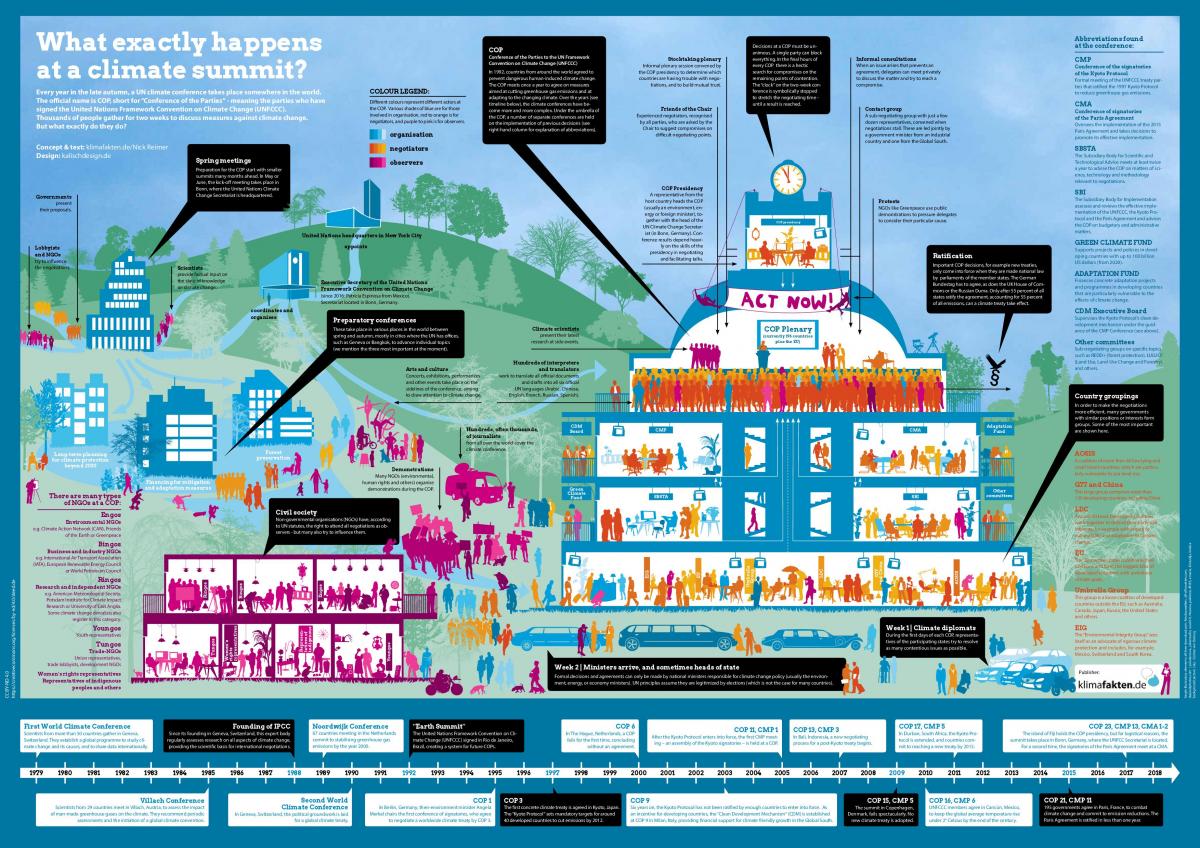Govt plans speedy power market reform - report / Grid fee troubles
klimafakten.de
Ahead of COP23 in Bonn in November, klimafakten.de has published a detailed infographic (see above) that explains processes, content and actors at a UN climate conference, and presents a timeline of past COPs. The graph is a translation from the Clean Energy Wire team's sister project, the German language climate science communication site klimafakten.de.
Find the infographic in English and German here and a press release in German here.
For background on the Bonn climate conference, read the CLEW dossier COP23 climate summit – All eyes on Germany.
Frankfurter Allgemeine Zeitung
The acting German government is planning a quick reform of the power market even before the new government coalition is formed, Andreas Mihm writes in the Frankfurter Allgemeine Zeitung. The reason is concerns that the EU might force German transmission grid operators to split the country into two power trading zones, Mihm says. This “imminent danger” means the acting government now wants to pass a law to manifest the German power market as inseparable. A split would lead to lower power prices in the North, where more renewable power capacity is located, and higher ones in the South. A lack of north-south grid connections means excess power from the North can often not be transferred to the South, where large industrial consumers are concentrated.
Read a CLEW article about the advent of the power market debate here and a factsheet on loop flows here.
WirtschaftsWoche
Germany’s transmission network operators have raised their prices, which leads to higher grid fees payable by consumers with their power price, reports Andreas Macho for the WirtschaftsWoche. Eastern German grid operators rose fees by up to 80 percent, and Amprion, in western Germany, will increase prices by 45 percent in 2018, the article says. The operators blame expensive investments in new grid connections and re-dispatch costs to keep the power grid stable. Analysts claim that calculations by these price hikes lack transparency as related documents are censored.
Read the article in German here.
For background see a CLEW factsheet on power grid fees in Germany here.
Handelsblatt
An internal federal government paper calls for an “honest debate about possible consequences” from learning that the country will likely miss its 2020 greenhouse gas reduction target by a wide margin, report Klaus Stratmann and Thomas Sigmund in Handelsblatt. The paper, seen by Handelsblatt, says that high costs for consumers, businesses and the state mean it was “hardly realisable” to achieve bigger reductions in the remaining three years, writes Stratmann and Sigmund. While a coal exit seemed like a “fast and relatively easily implementable measure”, the follow-up costs for the affected regions had to be taken into account. Achieving the CO₂ reduction necessary to reach the 2020 goal solely by exiting coal “cannot be expected or supported in light of the connected target conflicts”, says the paper. [The federal government press office declined to comment on the origin and authenticity of the paper.]
Read the article (behind paywall) in German here.
For background, read the articles Germany set to widely miss climate targets, env ministry warns and Coalition watch – The making of a new German government.


